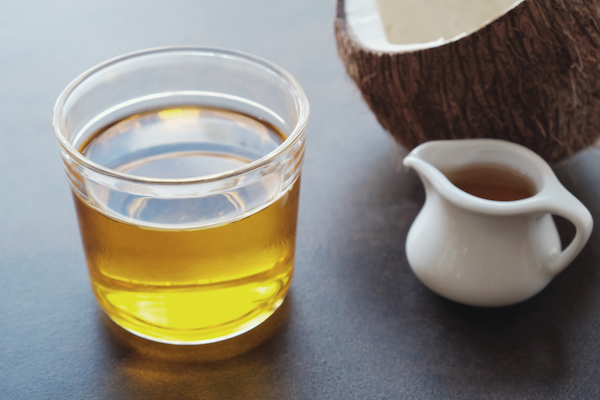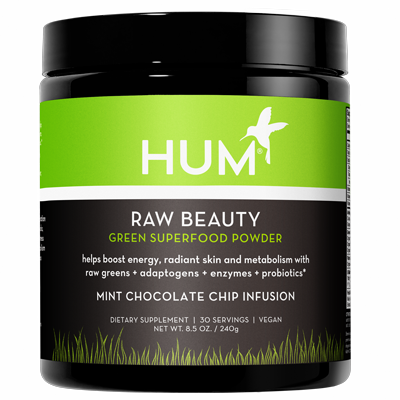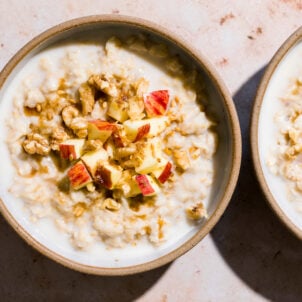3 Major MCT Oil Benefits According to a Nutritionist
Believe it or not, MCT oil isn’t something that just sprouted overnight.
In fact, hospitals have used it as a form of medical-nutrition therapy for quite some time. So why all the sudden recreational use in the wellness world? Aside from the keto craze, there are some attention-grabbing claims about MCT oil benefits that explain its recent rise in popularity.

What MCT Oil Is (And Isn’t!)
Before we jump into these claims, let’s clear up a myth about about MCT oil.
There’s some confusion about whether MCT oil and coconut oil are one and the same. For the record, MCT oil is not the same as coconut oil. In fact, isolated MCT oil doesn’t even occur naturally.
So what is it exactly? MCT is short for medium-chain triglycerides. It refers to a specific chemical structure found in naturally occurring fats such as human breast milk, whole-fat dairy products, palm oil, and yes—coconut oil. So while coconut oil may contain some MCTs, MCT oil is made from extracting these into a more highly concentrated source that differs from plain coconut oil.

What Are the Benefits of MCT Oil?
Weight Loss
The weight-loss benefits from MCT oil have a lot to do with its specific chemical structure. It has a shorter carbon-atom structure that allows for it to metabolize and absorb more quickly than other fats. This process results in a greater feeling of satiety, which leads to better portion control and decreased fat storage. Alternatively, a 2008 study says that MCT oil may promote weight loss through increased energy expenditure by having a thermic effect on food.
Regardless of which side of the energy-balance equation we look at, the end product appears to be weight loss. However, there aren’t many recent studies that can definitively prove that it’ll help you lose weight, so manage your expectations accordingly.
Gut Health
One clinical review on MCT oil promises gut-health benefits for patients who have severe GI disorders. But even for recreational consumers, there may be other gut health benefits. A more recent study shows promising evidence that MCT oil can help remodel your gut microbiota. Gut microbiota is a key marker for metabolic health. If you didn’t know, metabolic health can have an impact on the look of your skin, your immune health, and even your overall mood.
However, before you start guzzling it down in your morning coffee, here’s an important note. Ingesting excess MCT oil can cause gastrointestinal distress. Gas, bloating, cramping, diarrhea, and vomiting are all potential consequences of taking too much (or from simply consuming it on an empty stomach).
Energy
The unique absorption and rapid metabolization allows your body to use fat as fuel, instead of storing it for later. It means that our organs and muscles can use this fuel almost immediately. As MCT contributes to our body’s metabolic pathways, an excess in ketones occurs. Not only is it good for weight management, but it’s excellent for increasing energy. Some claim that MCT oil can also improve physical endurance for athletes engaging in high-intensity workouts, although more research is needed to solidify this claim.
The Right Way To Add MCT Oil Into Your Diet
- Don’t just add MCT oil to your current diet, as it can lead to some quick weight gain. Instead, substitute it for some of the other fats in your diet such as vegetable oil.
- Track your calories, especially in the first few weeks to help prevent weight gain. A tablespoon contains 115 calories and consists of 14 grams of fat.
- Don’t use it as your only weight-loss intervention tool. Eating a well-balanced diet that includes a variety of healthy fats and exercising is the best way to sustain long-term results.
- Prevent digestive distress by taking the appropriate amount. The recommended serving is a daily maximum of four to seven tablespoons.
- Divide your daily dose evenly across different meals by mixing it in with your foods and liquids.
- Maximize your gut’s digestive health by including a variety of different healthy fats to help your body absorb all the nutrients you consume.
- Pair it with a prebiotic and probiotic to promote overall digestive and gut health.
Final Thoughts
When it comes down to it, choosing MCT oil over other unhealthy fats is an overall good choice. Just remember, there’s a gap in credible research supporting some of the wilder claims you’ll read about online. Often, such diet trends “work” initially in part because of the transition to intentional dietary choices. With that said, however, integrating MCT oil into your diet may be an intentional choice that can reap many benefits.









